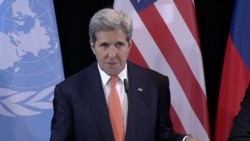U.S. Secretary of State John Kerry says major powers meeting in Munich to discuss the situation in war-torn Syria have agreed to a nationwide cessation of hostilities to begin in one week’s time.
Kerry told reporters early Friday in Munich that the cessation of hostilities will not apply to terrorist groups, including Islamic State, al-Nusra and others. He said the 17-nation International Syria Support Group has agreed that a task force co-chaired by the U.S. and Russia will work to “determine the modalities of a long-term reduction in violence.”
The top U.S. diplomat added on a cautionary note that the ISSG meeting has produced commitments on paper, but that the real test will be if all the parties honor their commitments.
The support group also agreed to “accelerate and expand” delivery of humanitarian assistance, starting with key troubled areas and then widening to provide increased humanitarian aid to the entire country.
Secretary of State John Kerry on the agreement:
A United Nations task force will oversee the aid delivery beginning with a meeting in Geneva and reporting on progress weekly.
Russian Foreign Minister Sergei Lavrov noted that the humanitarian situation in Syria is worsening and collective efforts are needed to stop it.
Geneva talks
Kerry said putting an end to “violence and bloodshed is essential,” but that ultimately a peace plan is needed.
To that end, he said the ISSG unanimously called for the Geneva talks to resume as soon as possible. He said the ISSG “pledges to take every single measure we can to facilitate negotiations.”
Earlier, U.N. Syria envoy Staffan de Mistura delayed until February 25 the next effort to get "proximity talks" under way. These would include members of the Damascus government and the main opposition groups in the civil war, but not meeting directly with each other.
Rebels: End 'Russia's campaign of slaughter'
A senior member of the Syrian opposition said earlier Thursday any cease-fire would be welcome if it ends "the current Russian campaign of slaughter," but that there must be guarantees that all of the Damascus regime's backers - including Iran-funded militias and fighters from Lebanon's Hezbollah movement - observe a truce.
Possible turning point in war
European diplomats told VOA they believed a delay in a cease-fire for several weeks would allow Russian and Syrian government troops to complete their operation to retake Aleppo and send even more refugees fleeing toward Turkey.
Regaining control of Aleppo, which has largely been under rebel control since mid-2012, would mark a possible turning point in Syrian President Bashar al-Assad's drive to crush his opponents.
“This is straight out of the Kremlin’s playbook,” said a senior European Union diplomat. He compared the Russian negotiating stance on Syria to Moscow's handling of the fighting between government forces and separatist, pro-Russian militias in Ukraine.
A Turkish official told VOA that Russia might be entering into a truce now because its military assault on Aleppo is now complete.
“Now they can focus on ... preparing for the next stage – Idlib,” the Turkish official said.
100,000 refugees in a week
In the past week, since a donor's conference about Syria in London, nearly 100,000 Syrians have fled from their homes, International Rescue Committee President David Miliband said.
The ongoing humanitarian crisis is “making a mockery of the international community’s commitment to help Syrians,” the former British Cabinet member said.
Plans to resume proximity talks between the government and opposition hinge on whether world powers can make sufficient progress in efforts to secure a cease-fire and provide humanitarian access to affected civilians.
Former U.S. ambassador to Syria Robert Ford says, "The most important thing is to somehow pressure the Russians and the Syrians to stop the aerial bombardments which are causing these floods of refugees.”
However, he added, the U.S. had not shown any “willingness to genuinely pressure Russia.”






